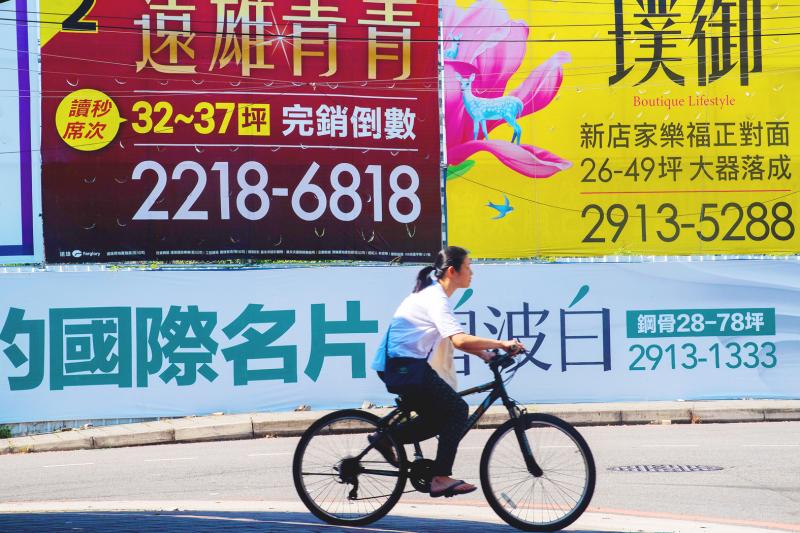Presale and new housing transactions last quarter totaled NT$382.7 billion (US$12.96 billion), rising by double-digit percentages from the previous quarter and a year earlier, as the market emerged from the COVID-19 pandemic unscathed, thanks to real demand and ample liquidity, a survey released by Cathay Real Estate Development Co (國泰建設) showed.
The transaction volume surged 42.9 percent from three months earlier and increased 14.7 percent from the same period last year, it said.
“The market appeared unaffected by the virus outbreak in light of the second-quarter results, but people had better be cautious and watch out for the pandemic’s fallout in the long run,” the quarterly report said on Thursday last week.

Photo: CNA
Housing prices soared 24.14 percent in Taichung to NT$274,700 per ping (3.3m2) in Taichung and jumped 12.34 percent to NT$266,800 in Taoyuan, the report showed.
Prices gained 7.59 percent to NT$264,700 per ping in Hsinchu and grew 5.91 percent to NT$228,800 per ping in Tainan. Taipei reported a 2.42 percent pickup in housing prices to NT$823,700 per ping and Kaohsiung witnessed a 1.53 percent increase to NT$237,100 per ping, the report said.
Housing prices in New Taipei City bucked the trend with a 1.93 percent decline to NT$403,100 per ping, it said.
Jinwen University of Science and Technology finance professor Chang Ting-hsuan (章定煊) said he was surprised at the rapid increase in housing prices, which reflected confidence on the part of developers and acceptance on the part of buyers.
Usually, it takes several years to see prices advance by double-digit percentages, Chang said.
Although real demand lent support, a sizable number of investors likely rejoined the market because of ultra-low interest rates in most other investment tools around the world, he said.
The central bank in March cut its policy rates to a record low of 1.125 percent, while peers in the US, Europe and Japan kept them near zero or in negative territory to help shore up the economy and avoid a liquidity crunch.
Sales rates for 30-day averages inched up 1.26 percentage points to 11.04 percent, while room for price negotiation narrowed by 0.1 percentage points to 13.29 percent, the report found.
Developers actively launched new projects and grew increasingly inflexible regarding price concessions, Chang said.
The supply side cannot single-handedly push up housing prices, Chang said, adding that buyers must have accommodated the pricing strategy.

Among the rows of vibrators, rubber torsos and leather harnesses at a Chinese sex toys exhibition in Shanghai this weekend, the beginnings of an artificial intelligence (AI)-driven shift in the industry quietly pulsed. China manufactures about 70 percent of the world’s sex toys, most of it the “hardware” on display at the fair — whether that be technicolor tentacled dildos or hyper-realistic personalized silicone dolls. Yet smart toys have been rising in popularity for some time. Many major European and US brands already offer tech-enhanced products that can enable long-distance love, monitor well-being and even bring people one step closer to

TRANSFORMATION: Taiwan is now home to the largest Google hardware research and development center outside of the US, thanks to the nation’s economic policies President Tsai Ing-wen (蔡英文) yesterday attended an event marking the opening of Google’s second hardware research and development (R&D) office in Taiwan, which was held at New Taipei City’s Banciao District (板橋). This signals Taiwan’s transformation into the world’s largest Google hardware research and development center outside of the US, validating the nation’s economic policy in the past eight years, she said. The “five plus two” innovative industries policy, “six core strategic industries” initiative and infrastructure projects have grown the national industry and established resilient supply chains that withstood the COVID-19 pandemic, Tsai said. Taiwan has improved investment conditions of the domestic economy

Malaysia’s leader yesterday announced plans to build a massive semiconductor design park, aiming to boost the Southeast Asian nation’s role in the global chip industry. A prominent player in the semiconductor industry for decades, Malaysia accounts for an estimated 13 percent of global back-end manufacturing, according to German tech giant Bosch. Now it wants to go beyond production and emerge as a chip design powerhouse too, Malaysian Prime Minister Anwar Ibrahim said. “I am pleased to announce the largest IC (integrated circuit) Design Park in Southeast Asia, that will house world-class anchor tenants and collaborate with global companies such as Arm [Holdings PLC],”

MAJOR BENEFICIARY: The company benefits from TSMC’s advanced packaging scarcity, given robust demand for Nvidia AI chips, analysts said ASE Technology Holding Co (ASE, 日月光投控), the world’s biggest chip packaging and testing service provider, yesterday said it is raising its equipment capital expenditure budget by 10 percent this year to expand leading-edge and advanced packing and testing capacity amid strong artificial intelligence (AI) and high-performance computing chip demand. This is on top of the 40 to 50 percent annual increase in its capital spending budget to more than the US$1.7 billion to announced in February. About half of the equipment capital expenditure would be spent on leading-edge and advanced packaging and testing technology, the company said. ASE is considered by analysts